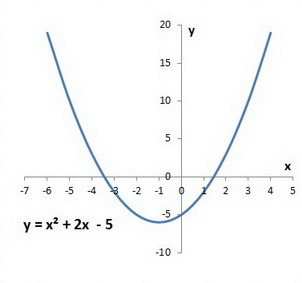The standard form for the equation of a parabola is
#y= a^2 + bx +c#
Your equation is
#y = x^2 + 2x - 5#
So
#a = 1#, #b = 2#, and #c = 5#.
Vertex
Since #a > 0#, the parabola opens upwards.
The #x#-coordinate of the vertex is at
#x = –b/(2a) = -2/(2×1) = -2/2 = -1#.
Insert this value of #x# back into the equation.
#y = x^2 + 2x - 5 = (-1)^2 + 2(-1) - 5 = 1 - 2 - 5 = -6#
The vertex is at (#-1,-2#).
Axis of symmetry
The axis of symmetry must pass through the vertex, so
The axis of symmetry is #x = -1#.
#y#-intercept
To find the #y#-intercept, we set #x = 0# and solve for #y#.
#y = x^2 + 2x – 5 = 0^2 + 2×0 -5 = 0 + 0 – 5 = -5#
The #y#-intercept is at (#0,5#).
#x#-intercepts
To find the #x#-intercepts, we set #y = 0# and solve for #x#.
#y = x^2 + 2x – 5#
#0 = x^2 + 2x – 5#
#x = (-b ±sqrt(b^2-4ac))/(2a) #
#x = (-2 ± sqrt(2^2 - 4×1×(-5)))/(2×1) #
#x = (-2 ± sqrt(2^2 - 4×1×(-5)))/(2×1)#
#x = (-2 ± sqrt(4 + 20))/2#
#x = (-2 ± sqrt24)/2#
#x = -1 ± 1/2sqrt24#
#x = -1 ± 1/2(sqrt(4×6))#
#x = -1 ± 1/2(2sqrt6)#
#x = -1 ± sqrt6#
The #x#-intercepts are at #x = -1- sqrt6# and #x = -1 + sqrt 6#.
Graph
Now we prepare a chart.
The axis of symmetry passes through #x = -1#.
Let's prepare a table with points that are 5 units on either side of the axis, that is, from #x = -6# to #x = 4#.

Plot these points.

And we have our graph.



